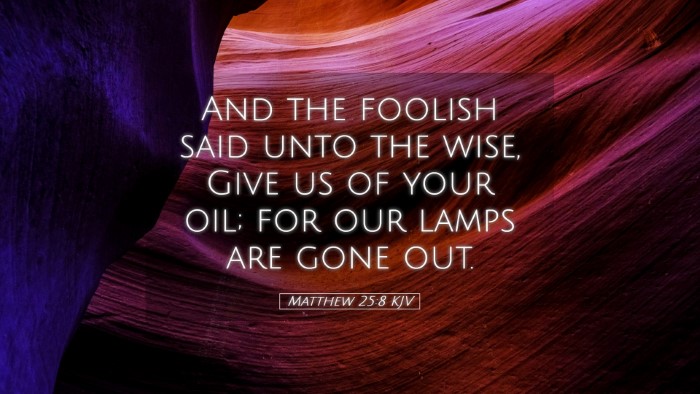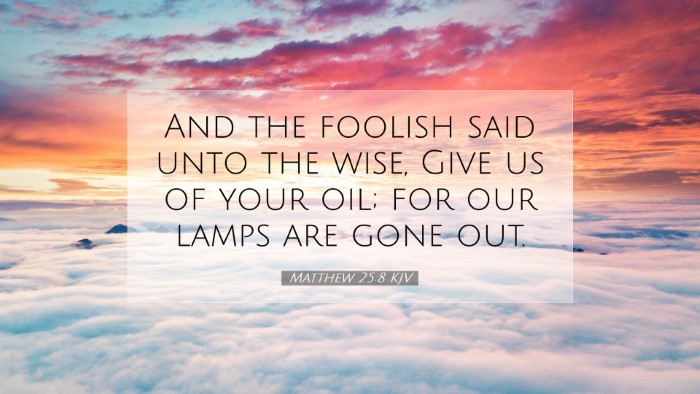Bible Commentary on Matthew 25:8
Verse Context: Matthew 25:8 states, "And the foolish said unto the wise, Give us of your oil; for our lamps are gone out." This verse is part of the Parable of the Ten Virgins, illustrating the consequences of being unprepared for the coming of the Bridegroom, which symbolizes Christ's return.
Commentary Overview
This passage serves as a profound reminder for believers to maintain their spiritual readiness and the consequences of neglecting this duty. The parable highlights two groups of virgins, the wise and the foolish, illustrating differing attitudes towards preparedness for the kingdom of God.
Insights from Public Domain Commentaries
Matthew Henry's Commentary
Preparation Matters: Matthew Henry emphasizes that the ten virgins represent the church, with the oil symbolizing grace or the Holy Spirit. The wise virgins’ foresight underscores the necessity of personal preparation for Christ's return. Henry notes that the foolish, who failed to bring extra oil, signify those who rely on external means or the preparedness of others rather than cultivating their own relationship with God.
Spiritual Readiness: He points out that when the midnight cry comes, indicating the nearness of the Bridegroom, it is too late for the foolish to procure what they lack. Their request for oil highlights a critical flaw in their spiritual journey—not cultivating their faith beforehand. Henry urges believers to ensure they are filled with the Holy Spirit, emphasizing the importance of daily spiritual disciplines, prayer, and engagement with God's Word.
Albert Barnes' Notes on the Bible
The Nature of Wisdom: Albert Barnes interprets the wise and foolish virgins to illustrate the contrast between genuine faith and mere outward association with the Christian community. The wise are those whose lives are marked by active faith and preparation; they understand the significance of the awaiting Bridegroom and have acted accordingly.
Consequences of Unpreparedness: Barnes highlights that the foolish virgins ask for oil, which symbolizes divine grace that cannot be transferred or borrowed. The rejection of their request serves as a metaphor for the finality of choices made in life; once Christ returns, there will be no opportunity to possess what has been disregarded. This aligns with the central theme of the parable: emphasizes individual responsibility to secure one’s place in God’s kingdom.
Adam Clarke's Commentary
Significance of Oil: Adam Clarke notes that oil is a symbol of the Spirit. He delves into the practical implications of the oil, asserting that true Christians must ensure they possess their own spiritual sustenance. Clarke remarks on the negligence of the foolish virgins, who are representative of nominal Christians who fail to engage with their faith genuinely or prepare for their eternal destiny.
The Plea for Oil: Clarke further emphasizes the ironic tragedy revealed in the request of the foolish virgins. Their appeal, "Give us of your oil," reflects a misunderstanding of spiritual realities. Oil cannot be shared; it signifies a personal and intimate relationship with God that must be cultivated. Clarke’s insights invite readers to consider their own spiritual state and to reflect on how they can prepare for the Day of the Lord.
Theological Implications
This parable presents significant theological themes regarding readiness, grace, and the individual nature of faith. The text prompts important questions for practitioners and scholars alike:
- Individual Responsibility: The passage conveys that each believer is responsible for their own spiritual preparedness. It challenges assumptions of communal faith and the notion that one can rely solely on the faith of others.
- The Role of the Holy Spirit: This commentary collectively emphasizes the necessity of the Holy Spirit as a sustaining force in the life of a believer, reiterating the importance of continual engagement with God.
- Imminence of Christ's Return: The urgency in the parable encourages continuous readiness in anticipation of Christ's second coming, reflecting a core tenet of eschatological theology.
Practical Applications
The teachings distilled from Matthew 25:8 offer practical insights for contemporary life:
- Daily Spiritual Practices: Engage in regular prayer, reading of Scripture, and communal worship to foster a deeper relationship with God, ensuring readiness for Christ's return.
- Accountability: Christians should surround themselves with fellow believers who encourage and challenge them to stay prepared, while recognizing that ultimately, each must secure their own faith.
- Evangelism: As a reminder of the eternally significant choices people face, this parable serves as an encouragement for believers to share the gospel and the urgency of accepting Christ before it is too late.
Conclusion
Matthew 25:8 serves as a poignant reminder that preparation for Christ's coming is vital. The insights from Matthew Henry, Albert Barnes, and Adam Clarke collectively urge readers to reflect on their spiritual vigilance and personal relationship with God. The lesson emphasizes that while we await the Bridegroom, the pursuit of holiness, personal responsibility, and the filling of the Holy Spirit are essential for a life that reflects readiness to meet Him.


